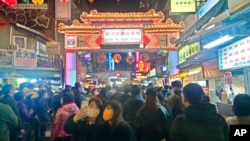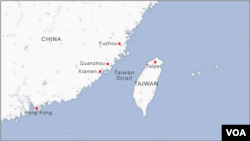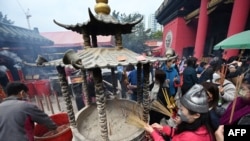A government error in Taiwan that saw a set of political restrictions on Hong Kongers and Macanese residents briefly published online has once again raised the question about how welcome they are, despite promises of support from President Tsai Ing-wen.
Dubbed by the local media as the “nine must not’s,” the list of prohibited activities appeared without explanation as a notice from the Mainland Affairs Council — the department that oversees Chinese, Hong Kong and Macau affairs — on Taiwan’s Immigration website in early January.
They include restrictions on participation in election campaigns, political activities and access to military buildings or biotech and research labs.
Following public outcry, the list was quickly removed and the council explained that the list had been posted mistakenly and no new restrictions had been placed on Hong Kongers and Macanese.
The council told VOA by email that while the restrictions exist already, they only apply to short-term visitors, usually tourists or language students, whose activities in Taiwan “should be in line with the purpose” of their visa.
While the issue appeared to be resolved relatively quickly, for Hong Kongers in Taiwan it was just another example of the island’s unclear immigration policies, said Gin Wu, a Taiwan-born Hong Konger who ran the volunteer news platform DB Channel in Hong Kong until 2021 after its co-founder was arrested on unrelated national security charges.
“The Taiwan government changes the law frequently, which makes it harder to really get used to it,” Wu said, by phone, comparing the situation to a football match without a referee. “How do you determine what’s OK or not?”
The predicament of Hong Kongers and Macanese in Taiwan has been through ups and downs since mass democracy protests in Hong Kong in 2019 that led many young people to consider the island, just an hour flight from home, as a possible refuge before the pandemic grounded many commercial flights between 2020 and 2022.
Neither Hong Kongers nor Macanese are technically considered foreigners by Taiwan — officially the Republic of China — as its government still formally claims sovereignty over all of China.
The Mainland Affairs Council told VOA by email that the nine rules listed in the post only apply to short-term visitors, and Hong Kongers and Macanese who remained in Taiwan on long-term visas have nearly the same rights as Taiwanese.
Taiwan’s government has also stepped up its assistance, opening a dedicated office in 2020 to help Hong Kongers and Macanese resettle, known as the Taiwan-Hong Kong Service Exchange Office. Since then, they relaxed rules around study and work permits that make it easier to stay or apply for a job.
Nevertheless, some would-be residents have been caught up by the island’s often byzantine and conservative bureaucracy and vague rules, as seen in the latest case of confusion over restrictions on their political rights.
Some Hong Kongers who migrated to Taiwan subsequently left because of difficulties in living here, from opening a business to finding employment if they had previous ties to the Hong Kong government, according to media reports.
The Mainland Affairs Council said problems may have arisen due to missing documents during the visa application process or attempts by Hong Kongers to immigrate through dubious investment schemes and “paper companies.”
Law Tsz-wai, the last vice president of the Chinese University of Hong Kong’s Student Union before it was disbanded by the school over national security concerns, told VOA that he also felt Taiwan’s rules could be vague, despite an overall positive experience moving here.
“The policy is actually kind of legitimate to me. However, the document itself and then the wording of the document [was] very ambiguous,” he said of the nine restrictions.
“I think most of us actually understand the reason for this policy, because we understand that [the] Taiwan government [is] dealing with a lot of pressure from the U.S., towards China, and spies and different concerns,” he said,” [but] this kind of policy isn’t clarified or explained well enough.”
Fang-yu Chen, a political scientist at Soochow University in Taipei and co-editor at the nonprofit organization US Taiwan Watch, told VOA that there appeared to be some divergence between the government’s official line and how it played out in practice.
“Our government does support Hong Kongers, however, the number [in Taiwan] is still very small compared to the total number of Hong Kongers who are in exile,” he said, “So, there’s some complaints that our government responded too slowly.”
More than 223,000 residents left Hong Kong between 2019 and 2022, but Taiwan’s population of Hong Kongers with residency visas or permanent residency only grew from 7,332 in 2019 to 12,858 in 2021, according to the latest available data from the Mainland Affairs Council.
The vast majority have instead chosen the U.K., which opened an immigration pathway for Hong Kongers born before the city’s 1997 handover to China and their families. So far, the plan has received 142,000 applicants.
Since Hong Kongers and Macanese are not considered foreigners, they are not eligible for professional programs such as one that allows qualified foreign professionals to live in Taiwan for up to three years.
Chen said issues like the “nine must not’s” post showed a continuing distrust toward Hong Kongers and Macanese, who are vetted during their visa applications for national security concerns and possible links to the Chinese government.
For two decades after their return to Chinese sovereignty, Hong Kong and Macao, two former European colonies, were viewed as distinct from China under the “one country, two systems” that allowed for a degree of political freedom not seen on the mainland. The distinction began to fade, however, with large-scale immigration of mainland Chinese to Hong Kong and the de facto collapse of “one country, two systems” after 2019, raising fears in Taiwan that both places could be used as departure points for spies and infiltration as their citizens face fewer travel restrictions than Chinese nationals.
Such fears are particularly strong in the Mainland Affairs Council and Immigration Department, two notably conservative institutions in Taiwan, said Chen.
“After that post, the lùwěihuì [Mainland Affairs Council] just said that it was a mistake… [but] I think there’s indeed some discussion inside the bureaucracy and there are some people really want to do this to Hong Kong people,” he said.






